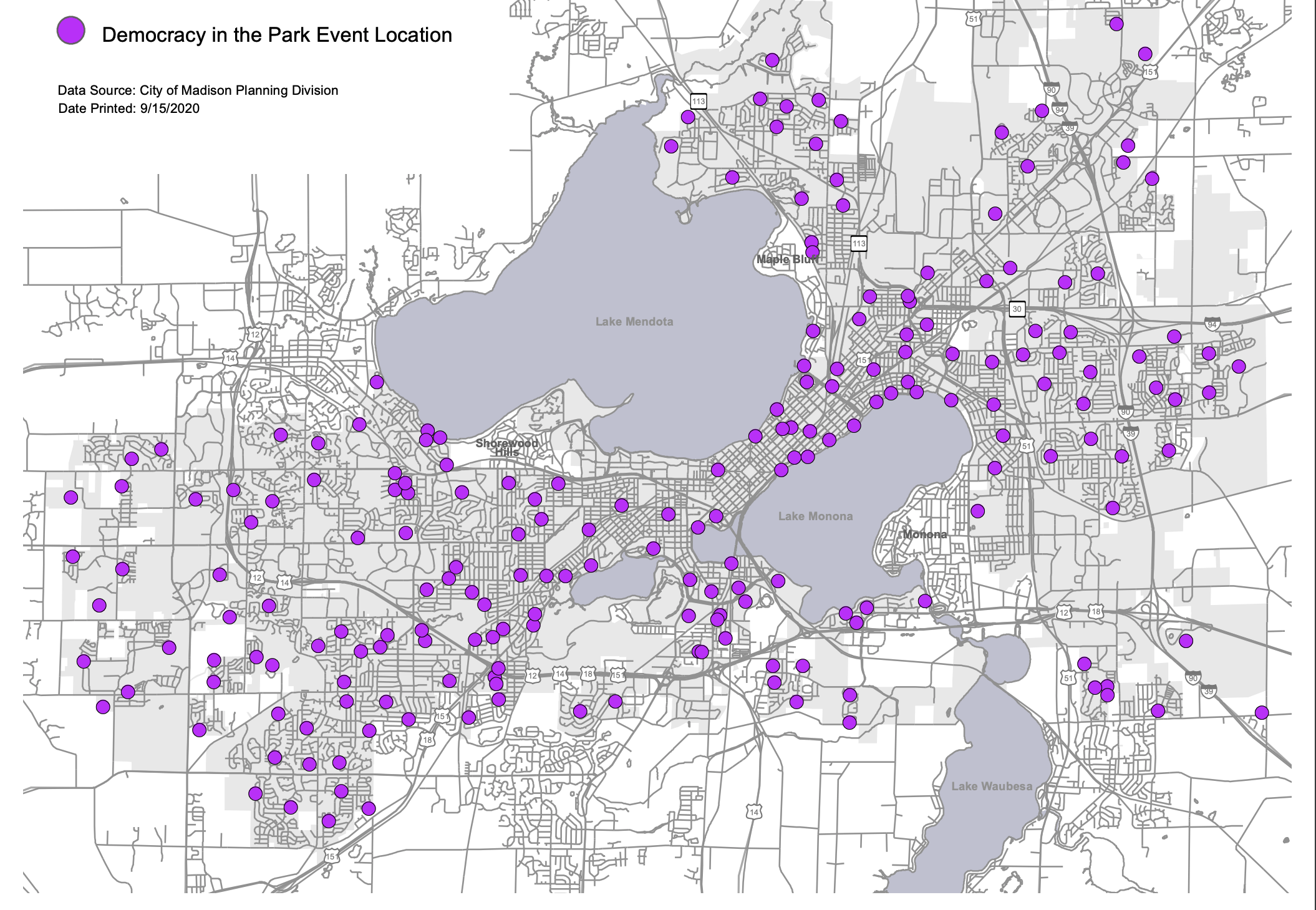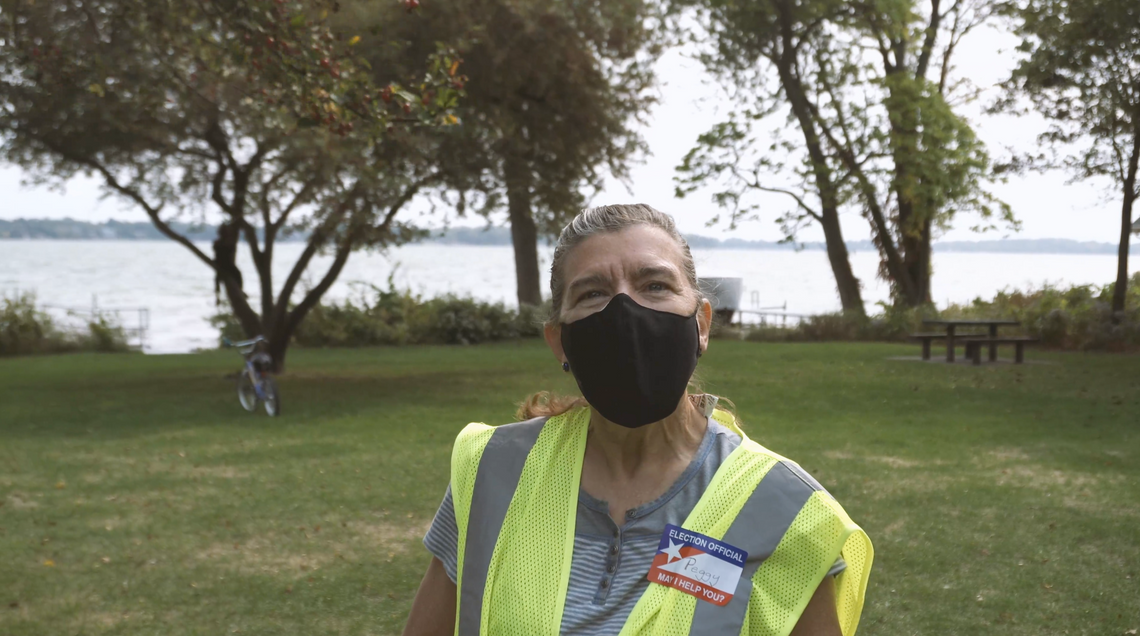On September 26 and October 3, poll workers spread out across parks and green spaces in the city of Madison, Wisconsin, to collect absentee ballots. The event was called Democracy in the Park, and it allowed people to drop off their ballots in convenient locations without having to travel to the City Clerk's office or worry about possible delays in the postal service. It was incredibly comprehensive, involving over 220 locations ranging from large community parks to "mini" ones. My wife and I dropped off our ballots in a grassy triangle about a block from our house that I always assumed was a very nice traffic median—turns out it's an officially designated mini park. You can get a sense of the scope of things from the city map:

When I first heard about the project, I was pleasantly surprised. In our political moment, when one of the parties has made disenfranchisement a part of their platform—and even challenged this event on baseless legal grounds—it felt downright radical to create an event that actually made voting easier. I wanted to see it in action, so I grabbed a mic and a camera and I set out to talk to some of the people involved.
What I generally overheard were the kind of small, human interactions that knit communities together. There was talk about the weather, the friendly exchange of hellos, anticipation for the next Packers game. There were focused questions about how the ballots were being collected and where they would go. There were side conversations about local and national issues. But the overwhelming sense was one of gratitude for the poll workers. Even if a person said almost nothing in the course of their drop-off, they said thank you to the poll workers.
Working the polls in "normal" years is a kind of thankless, invisible job that keeps the gears of democracy turning. These are the folks who find your name on the rolls when you show up, then make sure you have a pen and know what to do. In normal years this job is done almost exclusively by retirees, because of the bizarre fact that Election Day is not a national holiday. This year, of course, those very people are at the highest risk for COVID-19, and so a new generation of poll workers has emerged to work in their stead. These are students and other young people, folks who retired early, self-employed freelancers with flexible schedules, and anyone else who was able to carve out the time.
I wanted to capture the energy of Democracy in the Park and hear from poll workers, so I did very short interviews with some of the folks who were willing to talk. I asked them all the same two questions. How long have you been a poll worker? And why are you a poll worker? The answers ranged from the somewhat mundane ("I heard they needed people") to the pointed ("Because I think young people should be involved in civics") to the obvious but extremely important facts in the case ("It's important than everyone who is entitled to vote gets to vote and that every vote is counted").
It's no secret that many things are fundamentally broken in our political system right now: the Electoral College, the overrepresentation of small populations in the Senate, the politicization of the Supreme Court, the two-party system itself. I tend to think of voting in national elections as alternately a deeply personal decision ("which candidate aligns with my individual values?") and a cosmic one ("which candidate will tip the balance in the universe toward the side of justice?"), but the process itself remains a collective one. All elections, even national ones, are implemented on the local level, by a bunch of volunteers working together to make sure people who can vote do. Now more than ever, that's an important job.
This was also a fun exercise for me since it involved video, which I've been kind of curious about and have been slowly trying to explore over on the Field Noise Instagram account. So this seemed like a logical place to put them for now, though I am entertaining the idea of doing a different, audio-only edit at some point. But these are, of course, environmental sounds—the sounds of our neighbors making democracy happen right out in the open. My plan is to post these periodically until Election Day, so I'll hope you'll follow along, get inspired, and share them with friends and anyone who might need a nudge to vote this year.
Sounds Good

🎙 Phantom Power is a podcast that I love and occasionally contribute to, and their newest episode is a wonderful portrait of Siavash Amini, an experimental musician who has been gaining international recognition. Siavash's story is compelling in and of itself, and host Mack Hagood takes us through the details, many of which, he notes, are typical: outsider kid from a rural town dying to be an artist, working to get his hands on records and films, etc. But in this case, there is a difference: Siavash lives in Iran. Mack does a nice job wrestling with the obvious questions—what does he make of government censorship, the United States, theocratic rule, the sound of the oud—with the fact that even asking these questions already puts Siavash into a box constructed by Western viewpoints. Come for the story about kids bringing desktop computers to concerts, stay for the insights on how we think about and talk to people from other cultures.
🐦 I just started listening to Grouse, a new miniseries from BirdNote and former NPR environmental reporter Ashley Ahearn. It's a narrative that takes Ashley from the "echo chamber" of Seattle public radio out to a rural ranch in a much redder part of the state, where she learns about the environmental and cultural divisions over the greater sage-grouse. The show itself is compellingly told and I haven't even learned much about the sage-grouse yet. But I have heard it, and the sound it makes is insane.
🎵 One of my favorite music critics is Philip Sherburne, an American expat who lives in Menorca and covers experimental and electronic music for Pitchfork (here are some of his recent reviews). He's also a DJ, and recently put together this moody and beautiful two-hour mix of ambient music.
🪐 New Age music is back, if you haven't heard, thanks to record labels like Music from Memory and the simple fact that Enya is everywhere. In this vein, I recently discovered the "A New Age for New Age" series, which now has two volumes. I'll link to the Bandcamp below, but it also exists on Spotify and Apple Music. I found that it can be tricky to search for, though, so start with one of the artists' names.
